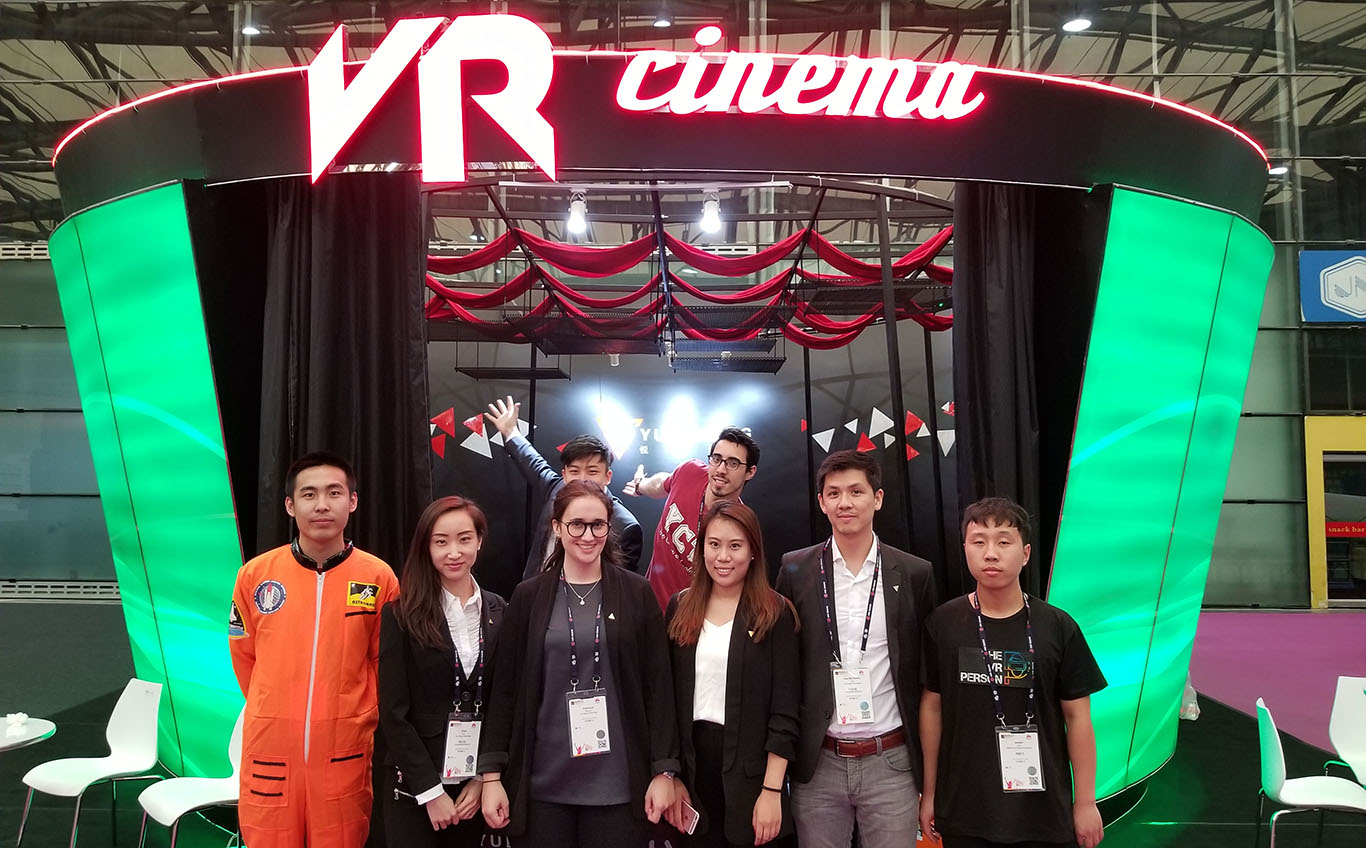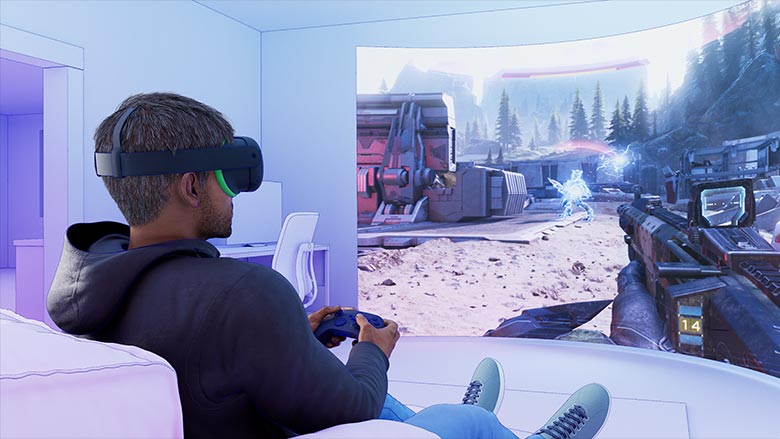First professional VR cinema opens in Beijing
While Virtual Reality renaissance has started in the US and the US are the most forefront country in VR development, we are all curious about what happens in China, that is the second biggest economy of the world. VR in China is becoming huge, but it is growing very differently than here: since Chinese people can’t afford a high-end headset and there the arcades are still popular, Virtual Reality arcades are becoming very widespread. There people can experience amazing VR experiences for few money. As Springboard guys told me, VR arcades in China are growing very fast but also in a very confusing way and they don’t always offer the best experience possible.
Some days ago I’ve been contacted by Yue Cheng Media, a Chinese company opening a “VR Cinema”. I was thinking it was just the bazillion-th VR arcade that is opening in this world and I thought that the world “Cinema” was just a name in disguise for arcades… but they confirmed me they’re actually interested mainly in movies, not in games and this got my curiosity. Furthermore I discovered that in that company works an Italian girl (Francesca) and as an Italian guy studying Chinese, well, I can only be admired by some compatriot that not only is a woman in VR, but has also managed to learn Mandarin (while I’m just here saying 我他妈什么都听不懂 to everyone speaking Chinese to me). So, I decided to get some further info about this interesting project. This is the interview I made with them.

Tell me about this VR Cinema project!
The VR cinema is the result of a triple partnership in between Gome Group, HTC Vive and Yue Cheng Technology, each part being involved in a different aspect of the cinema.
We pride ourselves in being the first professional VR cinema in the world by bringing a mix of Gear VR and high-end VR with the HTC Vive on top of a novel pay-per-time so users will be able to experience and discover VR driven by their own curiosity rather than paying for each experience.
Our cinema is divided in three areas:
Light Space: equipped with Samsung Gear and Samsung Galaxy S8+ where we show 360° videos;
Dream Space: equipped with HTC Vive and HP professional PC where we show roomscale interactive contents; please note that the contents we show here are interactive stories, like Penrose’s “Allumette” or Titmouse’s “Show it 2 me”, as well as some VR games with a narrative or an educational purpose. We are not an arcade and have not the ambition to be, but still want to offer a complete snapshot of what VR is to our patrons.
Future Space: in our waiting area we show the most creative and innovative technology products to Chinese consumers and Media companies.
The cinema is meant to be a space to raise awareness of VR with a pay per time business model, with the opportunity to try content on Samsung Gear VR as well as HTC Vive for an all around experience. The cinema also offers some new technologies with the exhibition of some robots, a 3D printing space and an AR experience.

Why do you define it the first professsional VR Cinema?
During his speech YCT’s CEO Gu Bin elaborated why this can be considered the first professional VR cinema:
1.Design: the cinema has a professional design specially thought for enhancing the view of VR movies; it’s the first time that a cinema uses lights for dividing spaces and that incorporates a 3D printed dome;
2.Content: all the movies shown in the cinema come from some of the world’s best VR studios; YCT is currently establishing business relationships with 58 different cutting edge VR content producers.
3.Equipment: all the cinemas will be provided with the best headsets on the market, like HTC VIVE, Samsung Gear with Samsung Galaxy S8 Plus and HP professional VR PC.
4.Software: YCT’s developed its independent remote control system and cloud computing platform that will guarantee the protection of producer’s copyrights and the transparency of all data.
HTC Vive China Regional President Mr. Wang Congqing stated that this is the World’s first professional VR Cinema and that he will support the expansion of the project together with other technology partners like HP.
[If you’re superskilled with Chinese, you can see the report that CCTV, the National Chinese Television, has made for the opening of such Cinema. I’ve tried seeing it, but, ehm… 我他妈什么都听不懂]

How many movies do you currently have in your catalogue? I’ve read about partnerships, so how many do you expect them to be in 1 year or two?
Currently we have partnerships with several content producers and have the license for over 30 pieces, although that number is increasing quickly. We are also engaged in partnerships for several coproductions with major studios. We cannot publicly disclose all the partnerships right now but we are willing to get as many as possible in order to contribute to the advent of VR through different projects.
What are you going to do when in 5-10 years all people will have a VR glass at home and can see the VR movies at home?
Our plan includes updating the technology regularly to stay ahead and offer cutting-edge experiences not available at home, so as the VR becomes mainstream (something we wish very dearly), we are planning to stay on top of technology to stay relevant.
How do you handle hygiene of headset between different usages of people coming to your place?
For the hygiene we use disposable headset masks available freely throughout the cinema.
What about motion sickness, eye strain, etc…?
We usually use high quality content resulting in very few cases of discomfort among users, the worst cases we had were dizziness and were taken care of immediately as we have employees checking on the well-being of patrons at all-times.
How do you envision the future of VR filmography? Do you think it will replace standard one or that it will live along it? How will VR movies be in 5-10 years?
We personally don’t think VR contents will fully replace traditional movies because albeit new, the format is different. It will have an effect similar to the advent of movies to theater, not extincting the genre but becoming more popular due to its novelty. VR has the huge advantage of redefining what is possible and blurring the line in between game and movie, and we do believe more interaction will become the norm or at least more widespread in the next 5 to 10 years. Just like today’s cinema is rather coded with techniques known and studied in film academies (type of plans, how to use different plans to convey different emotions…), VR will become more coded and less experimental as today.
How do you envision the future of VR in general?
The future of VR is standalones for the public with higher end experiences in location-based venues. Outside the hardware, VR will become more and more ubiquitous as people and different sectors will realise the potential (just like today’s design firms realising they can make models with VR instead of traditional methods for example).

We Western people are very curious about VR in China. Can you tell me your point of view about it?
The public is more open to the technology and welcomes the new experience more than elsewhere (also at the moment of buying, people think of it less as a trend like in the West). The Chinese government helps quite a lot as well with a lot of investment and funding (they created a VR friendly city from nothing, named Donghu VR city, you can check this article as reference also). The investment is as crazy as the market, sometimes way too much because the overall quality of content is still very subpar, a few Chinese companies emerge as producing good international content and although developing faster than anywhere else, we believe the market needs to see and be in contact with great international content to be able to improve.
How many visitors are you having? How much does the experience cost?
We’ve had over a thousand visitors since the opening, although we are still in soft opening, the 2 first weeks were only for media and now we have 2 weeks free entrance for the public, before ending this soft opening period. After that it will be 30rmb an hour, 50rmb for 3 hours and 90 for the whole day. On top of that a premium fee of 1rmb per minute will be charged for the use of high-end Vive. [1 rmb = circa 0.15$]
Have you anything more to add?
We’ve displayed a pop-up VR Cinema at MWC at Shanghai with a lot of success!

That’s all for the interview, now it’s time for some commentaries by me.
I think that this is an interesting project. Surely it is not the first VR Cinema of the world (we all remember VR Cinema in Amsterdam), but it is one of the very few out there. And it is a high quality one: as you’ve read, there’s a lot of care on hygiene (I advise to always care about hygiene in VR events!) and people feeling dizzy; the photos show an environment well crafted, with an accurately designed lighting and a 3D printed dome.
People now is concentrating especially in gaming, with arcades and similar but are not that much thinking about seeing movies together. This is important, because if more VR cinemas will come out, there will be more interest in producing VR storytelling content and this is very beneficial for the ecosystem. Yue Cheng Media is partnering with various studios that produce content and this will mean the creation of high quality VR movies. I’ve already told you how producing VR videos is hard and requires a lot of experimenting and buying expensive cameras. The more producers will now there is market for their masterpieces, the more they’ll be interested in producing them and this will lead to a better understanding of the rules of how shooting these movies and so to better movies.
I appreciate also the fact that they don’t show only 360 videos: while these are pretty, sometimes they feel like they’re a little too few for VR (someone argues that they’re not even VR). Focusing on all storytelling experiences lets the user live also emotional adventures like Dear Angelica or Allumette, that are more immersive and would reduce in tears even The Rock. The innovation wrt other VR cinemas is here, along with the fact that they use high-end tethered headsets, while for instance the Dutch VR Cinema only lets you use GearVRs. This allows the visitors to enjoy top quality content.
So, I think that an initiative like this is beneficial for Chinese users (that this way can try high-end storytelling experiences that can’t live at home) and media producers (because this way they can have more customers and hence made more movies). So, it is better for the whole VR Chinese ecosystem. And their attention to the VR ecosystem is visible in the words “as the VR becomes mainstream (something we wish very dearly)”: I thought they would be scared by everyone having a VR headset at home, but actually they’re so confident in the product they’re offering that they are very happy of seeing VR having success. Wow.
Francesca’s words about help of Chinese government are astonishing: “they created a VR friendly city from nothing, named donghu VR city“. I read about Xi Jin Ping (China’s prime minister) talking about China’s interest in new technologies like AR and VR, but creating a VR city is… well, a bit above my standards.

But this is great, I would like to have even here in my country such a support. The fact that the VR Cinema has got a reportage on the national Chinese TV underlines the fact that there is a lot of interest there about VR and the willing to push this tech. When here opened the first arcade, national television has just ignored it.
The crazy and chaotic growth is underlined by the sentence “The investment is as crazy as the market, the overall quality of content is still very subpar” while “the market needs to see and be in contact with great international content to be able to improve” makes me think that while the growth is enormous, Chinese people have still something to learn from us (yeah, we’re useful!). As I’ve said in my last article about VR in China, I think that Chinese people are very efficient, but first they have to learn from us how to do things and then they’re great in optimizing and reducing costs. These words from a person inside a Chinese company show us that the impression we had is quite right. And I’m still very curious about the future of this Eastern VR market… will it supersede Western one?

Disclaimer: this blog contains advertisement and affiliate links to sustain itself. If you click on an affiliate link, I'll be very happy because I'll earn a small commission on your purchase. You can find my boring full disclosure here.



